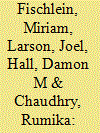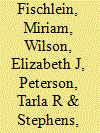|
|
|
Sort Order |
|
|
|
Items / Page
|
|
|
|
|
|
|
| Srl | Item |
| 1 |
ID:
125568


|
|
|
|
|
| Publication |
2013.
|
| Summary/Abstract |
Strategies that provide information about the environmental impact of activities are increasingly seen as effective to encourage conservation behavior. This article offers the most comprehensive meta-analysis of information based energy conservation experiments conducted to date. Based on evidence from 156 published field trials and 525,479 study subjects from 1975 to 2012, we quantify the energy savings from information based strategies. On average, individuals in the experiments reduced their electricity consumption by 7.4%. Our results also show that strategies providing individualized audits and consulting are comparatively more effective for conservation behavior than strategies that provide historical, peer comparison energy feedback. Interestingly, we find that pecuniary feedback and incentives lead to a relative increase in energy usage rather than induce conservation. We also find that the conservation effect diminishes with the rigor of the study, indicating potential methodological issues in the current literature.
|
|
|
|
|
|
|
|
|
|
|
|
|
|
|
|
| 2 |
ID:
097343


|
|
|
|
|
| Publication |
2010.
|
| Summary/Abstract |
As climate change mitigation gains attention in the United States, low-carbon energy technologies such as wind power encounter both opportunities and barriers en route to deployment. This paper provides a state-level context for examining wind power deployment and presents research on how policy stakeholders perceive wind energy in four states: Massachusetts, Minnesota, Montana, and Texas. Through semi-structured interviews, state-level energy policy stakeholders were asked to explain their perceptions of wind energy technology within their state. Interview texts were coded to assess how various drivers promote or hinder the deployment of wind power in sub-national contexts. Responses were dominated by technical, political, and economic frames in all four states, but were often driven by a very different rationale. Environmental, aesthetic, and health/safety frames appeared less often in the discourse. This analysis demonstrates that each state arrived at its current level of deployment via very different political, economic, and technical paths. In addition to helping explain why and how wind technology was - or was not - deployed in each of these states, these findings provide insight into the diversity of sub-national dialogues on deployment of low-carbon energy technologies.
|
|
|
|
|
|
|
|
|
|
|
|
|
|
|
|
| 3 |
ID:
121270


|
|
|
|
|
| Publication |
2013.
|
| Summary/Abstract |
Efforts to plan and site transmission for wind power cannot currently keep pace with wind power development. The very nature of wind power, whether distributed or intermittent, challenges traditional models of electricity grid development. Much of the decision authority for transmission is located at the state level, creating tensions between a system-wide need for transmission capacity and the local nature of planning and implementation. This study identifies and discusses barriers for wind power transmission and highlights the critical role of states and state policies in expanding and transforming the electricity grid to accommodate large scale wind power. Drawing on extensive interview data with energy stakeholders, we present a comparative case study of state-level contexts linking wind and transmission in Montana, Minnesota, and Texas. Stakeholders were found to portray transmission challenges and solutions for wind power based on the character of the local transmission grid, their status as power importer, exporter or self-sufficient state, and the role wind already plays in the power supply.
|
|
|
|
|
|
|
|
|
|
|
|
|
|
|
|
|
|
|
|
|